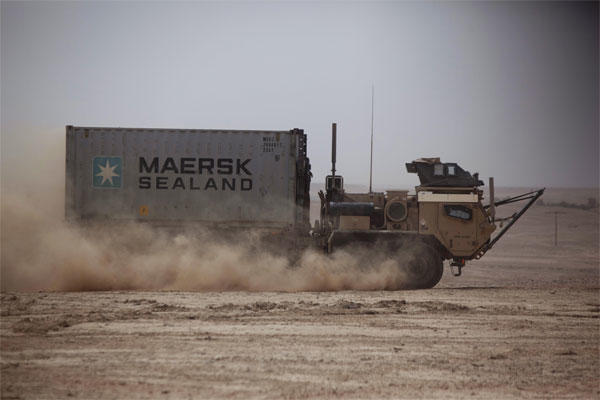CAMP LEATHERNECK, Afghanistan -- There’s a small, ramshackle hut just beyond the entrance to Forward Operating Base Kajaki, which overlooks an elbow in the Helmand River in southern Afghanistan.
A splintered section of plywood serves as both a patch for a hole in the wall and poorly written sign to alert potential customers of the “marinE ShOP,” where the “a” is spelled backwards. A light bulb dangling from bare electrical wires illuminates the sales window at night.
To call it rustic would be kind and inaccurate.
The handful of potato chip bags and knickknacks inside represent the limited consumer goods available to the Marine garrison on the base. They rely instead on the occasional visit of a special breed of Marine.
“We are the only group that does anything even similar to this,” said Marine Sgt. Arthur Doers, a native of Iron Mountain, Mich., and Marine Corps Community Services specialist with Combat Logistics Regiment 2, Regional Command (Southwest).
Doers pairs up with military convoys and travels through active combat zones to do what nobody outside the Marine Corps does – deliver stocked shelves of amenities to nearly any forward deployed garrison.
“We don’t have to do it,” admitted Doers, who volunteered for the job after serving several years as a helicopter crew chief. “It was an idea that was brought up, and we want to do it. Realistically, it’s the people who are out in the middle of nowhere, located in these austere conditions, who need the stuff.”
On Aug. 4, Doers and a small contingent of Marines fell in with members of the Army’s “Blue Spaders” with 1st Battalion, 26th Infantry Regiment, who were heading toward Kajaki.
The soldiers had their own logistical mission, but willingly provided a security blanket so Doers could perform his.
The convoy set out on its nearly half-day trek to the FOB, passing empty expanses of sand and a reclusive nomadic tribe. Clouds of dust outlined its path through the arid desert surrounding Camp Leatherneck and into the greener and more densely populated district of Sangin.
Infrastructure development projects have helped alter the landscape, where roads now pass around a “green zone” of irrigated farmland nestled below rocky mountains.
The area is no stranger to conflict, and Afghan National Security Forces maintain numerous outposts throughout the region. Once barren streets now bustle with commerce in the markets outside the base.
“Usually, a Marine unit will escort us around,” said Doers. “However, if the Army already has convoys set up to go to locations [where] we are not scheduled to go with a Marine unit, then we’ll go ahead and imbed with the Army.”
The willingness of surrounding units to help reflects the unique mission of MCCS Marines, who provide services to more than just Marine units in the field. Doers sells to any member of the military and even civilian contractors.
“It doesn’t really matter to me … they’re stuck out in the middle of nowhere with nothing as far as the comforts of home,” said Doers. “We’re all different services, but we’re all collectively brothers and sisters in this thing.”
For his part, Doers studies his clientele just like any other business owner. He pours over his sales data after every mission to better meet the evolving demands of servicemembers in the field.
There are the obvious necessities, such as hygiene items and clothing, but the real personal impact comes from what Doers calls the “nice-ities.” It’s the candy, snacks, and other comfort items that don’t exist on the smaller bases. In one particular case, a Marine simply wanted a fishing magazine.
“The smallest little things make somebody light up,” said Doers. “Even though we’re taking about grown adults here, it’s still a good feeling in your heart when you see somebody get that happy over something.”
“It’s a lot of work that goes into preparing for this,” he continued. “I have to count every item that goes into the truck … It makes it all worth it when you get done, and you get to see you made a difference helping somebody who hasn’t had much of anything for the last couple months.”
There is no military school to train volunteers such as Doers. MCCS Marines rely on the experiences of their predecessors and on the job training. What is more, their missions are lucrative.
Within 45 minutes of opening shop, Doers totaled nearly $2,000 in sales. After an additional stop on the way back through Sangin, the number climbed to more than $3,500 and 109 customers.
“As simple as it is, they love it,” said Doers. “It makes me feel like it’s all worth it.”





























